STREETLY,
STAFFORDSHIRE
MEMORIES
(1936 - 1961)
WEDNESDAY 7th
JUNE 1944
- TINTERN, NORMANDY and
ROME -
by Chris Myers
|
Wednesday, 7th June 1944.......
Hello
again, it's Wednesday, 7th June
1944. It's been a normal school day for
me today, here in Streetly, like every day this week.
Although
yesterday wasn't really normal,
or so it seems. Grown-ups are
calling it an important moment
in history. I suppose it must
be.
But before I get to that, I told you
last time about
my eighth
birthday, in April. And I said that we
were going to have a holiday. We
did. Lucky me! A week in a place
called
Tintern. We had to
change trains twice on the
journey. Once at
Chepstow. It was a farm
we stayed at - no electricity,
no inside lavatory and so just
chamber pots, but lovely food.
I don't think they have heard of
rationing there. So we got
an egg EVERY day! We have stayed
there once before, last year.
It's all exactly the same as
then. The little stream
is still there in front of the
house which I can play in. (This
time, though, I managed to fall
in). And also the little pub where we
can sit outside and I get given
a small glass of cider
with lemonade in it and feel
quite grown up. In the woods the
anthills are nearly as tall as I
am, just like last time.
The farm dog is still
there as well. I expect he doesn't
remember biting me on the cheek
last time but I do and I still
have the scar. THAT was all a
real kerfuffle! I'm
keeping my distance. And
definitely won't be trying to
stroke him again while he's
eating his bone.
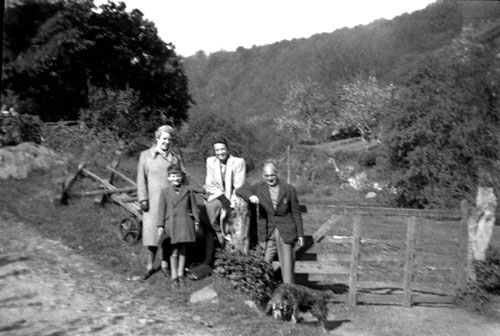 We
were there with some friends
from
King's Norton, Mr. and
Mrs. Ward and their son Martin
who's a lot older than me.
They've been friends since
before I was born and they used
to go on camping holidays
together. Here are Mr. and Mrs.
Ward with Mum in the middle.
And me of course, and their dog.
This one doesn't bite. (Mr.
Ward is in the Home Guard,
just like Dad). We
were there with some friends
from
King's Norton, Mr. and
Mrs. Ward and their son Martin
who's a lot older than me.
They've been friends since
before I was born and they used
to go on camping holidays
together. Here are Mr. and Mrs.
Ward with Mum in the middle.
And me of course, and their dog.
This one doesn't bite. (Mr.
Ward is in the Home Guard,
just like Dad).
When it was time to go home, the
journey seemed to go on for
ever. We kept on being
shunted
off
the main line to let other
trains go by. There seemed
to be lots of them. It was dark
by the time we got to the
Lickey Incline and Dad
was telling me to wait and feel
the bump as the banker engine
buffered up to us at the
back. I let the carriage window
down on its leather strap and
peered out. I got a real shock.
Just up the line at the side of
us, with
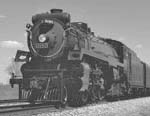 steam billowing out all
around it, was an American loco!
Just like you see in the films,
huge and with a cow-catcher on
the front. But no big
headlamp. Not in the
black-out! What it was
doing there, I have no idea.
They usually have a special
engine there to do the banking.
Perhaps it was just giving a
hand. steam billowing out all
around it, was an American loco!
Just like you see in the films,
huge and with a cow-catcher on
the front. But no big
headlamp. Not in the
black-out! What it was
doing there, I have no idea.
They usually have a special
engine there to do the banking.
Perhaps it was just giving a
hand.
The Lickey Incline is always a
thrill for me. I've been
up it two or three times now.
(And down it as well, I suppose,
but you don't notice that). I
once saw it from the outside.
From a hospital window. Two or
three years ago.
I was only a little boy then but
I remember it ever so well.
It was at a place
called
Blackwell. My brother,
Graham, was there. He was
one side of a ward with a lot of
people there as well. The
windows on the other side had a
super view of the Incline. But
my brother couldn't see anything
of it. Both of his eyes
were bandaged because he had
just had an operation. It was
strange, watching him fumbling
for a bit of chocolate when Mum
passed it to him. And a bit sad.
I hadn't seen someone who was
blind before. Poor Graham! And
what made it worse for him was
that he was mad on trains, just
like me. And there he was, with
a wonderful view of the main
line, and he couldn't see a
thing!
I got ticked off that day.
When I realised what could be
seen out of the windows I tore
across the ward as fast as my
legs would carry me. And then
got the lecture. You don't
run or make a noise in
hospitals. There are other
people there. You must
always remember how they are
feeling. And so you must
never behave in the wrong way
which might disturb or upset
them. (It seemed to be the
same rules in a library or in
Church. There was SO much
you had to remember when you
were only little).
My brother was only blind for a
few days. And he got home and
was soon better. Back to his
Home Guard duties with Dad and
waiting for his call-up papers
which could come at any time. He
was looking forward to joining
the
RAF as a bomb aimer.
I don't know why he wanted that,
rather than becoming a pilot.
But they had told him, yes, OK,
you can become a bomb-aimer
provided you have that eye
operation first. So he had the
eye operation. Finally the
call-up papers arrived. That was
two years ago, almost exactly -
June 1942. What did they tell
him? It wasn't to be the Royal
Air Force. It was the
Royal
Artillery instead. So no
big bomber. No Wellington
or Stirling or Halifax or one of
the new Lancasters. A big gun
instead.
I don't know if he was
disappointed. I bet Mum and Dad
weren't, though!
But I must get back to today,
Wednesday 7th June 1944.....
Even though this week has
been just a normal week for me, yesterday was
really a very special
day. I didn't know anything
about it until I got home from
school. We only listen to the
wireless in the evening. I
expect that people started to
find out about it during the
day. But Miss Cook and Mrs
Fairey, our teachers at
Sandwell
School in
Egerton Road, Streetly, didn't say anything
about it and so they probably
didn't know either. Otherwise I
expect we would have had a
little prayer for the soldiers,
or something like that.
So I learnt about it from
hearing Mum and Dad talking. And by reading
the
Birmingham Mail. We get
it delivered every evening and
I'm now old enough to read
nearly all of it. Or at least
the bits which interest me. I
like the For Sale page where
sometimes somebody is selling
some second-hand Hornby Trains.
They probably belonged to a boy
who is now grown-up and is away,
somewhere, fighting. And
sometimes I read the news. I did
that last night. This was
yesterday evening's front page
in the Mail.
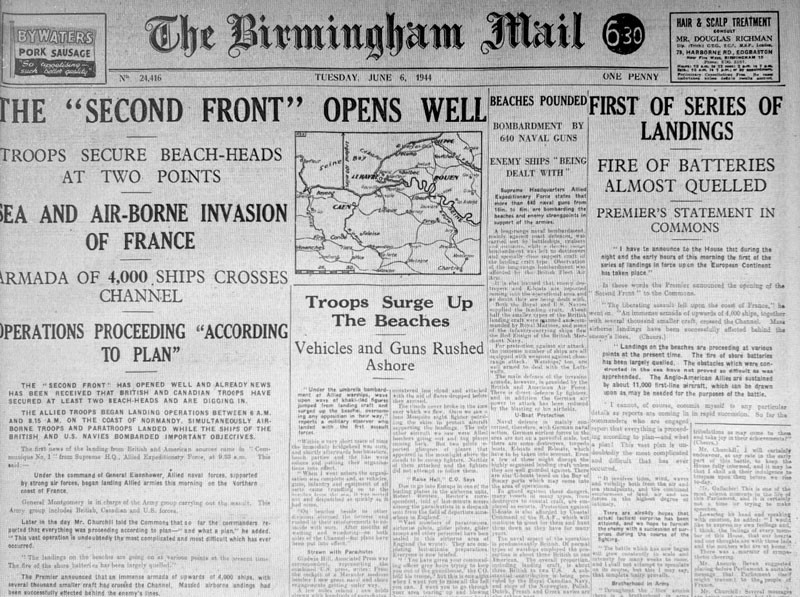
Later, after our wireless set in
the dining room had been
switched on and warmed up, we
listened to the news on the BBC
which told us more about it. It
was the Armada bit which really
impressed me. It was the biggest
Armada ever. It made me think of
Sir Francis Drake. So it has
happened! I wonder why
they call it D-Day.
If I think about it, I know this
is very important. But, to be
honest, it does seem to me
to be just another bit of the war which has
been going on for ever. People
have been talking for weeks that
it is going to happen and I
suppose that, now it has, it
doesn't come as a huge surprise.
Things for me carry on just the
same, today, tomorrow, next
week. Even so, it has to be
really good news. Of course it is. I'm sure it will bring
peace nearer. I can even start to
think of a day when Mum can get
bananas and oranges in the
shops, we might possibly go to the
seaside for our holidays or
I even might get a brand-new Dinky Toy
bought for me. And I'll be able
to see
grown-ups not worried about
anything any more, and perhaps
never again.
But goodness knows when. I don't
remember much at all what
pre-war was like. For me, the
war has always been here, in the
background, part of my life.
And I can't really imagine
post-war.
If I have enough imagination,
and I probably haven't, I can
think of that Birmingham Mail
being the way that a lot of
people in
Birmingham and around
here found out about what was
happening yesterday. Somebody at
work will have passed on the
news. Or they'll have picked up a
paper on the way home.
Possibly from the bloke in
New
Street by our bus stop who
shouts something which sounds
like "SpatcherMile". They'll be
happy when they read the news in
the Despatch or the Mail. And
then, a moment later, they'll
start to think "Oh, what about
our Frank?" (Or our Ron or Jim
or Arthur or Ted or Mike). Frank is away,
somewhere - and somewhere in
this country. No one knows
exactly where at the moment, or
what is he doing. Is he all part
of this? Is he OK? When will we
know?"
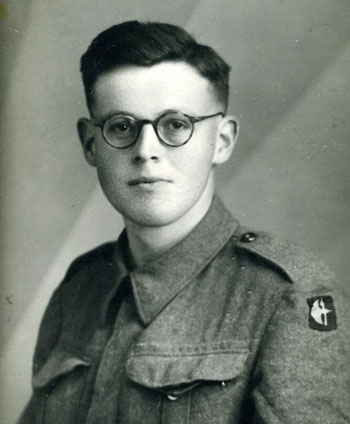
We don't have that worry about
my brother.
He is in the
17th
Field Regiment, Royal Artillery,
part of the
78th
Division. He is what will soon
be known as a D-Day Dodger.
(That's something called
sarcasm).
We know he is safe
in Italy, with all his mates and
their big guns.....
..........
SAFE ???
POSTSCRIPT
(7th June 2024)
Much, much later - more
than half-a-century later,
at around the millennium
- my brother Graham will tell us
what he was doing at that
moment in time and
history, days after the
end of the
Battle of Monte Cassino,
and now travelling
northwards, on the road
to
Rome.....
|
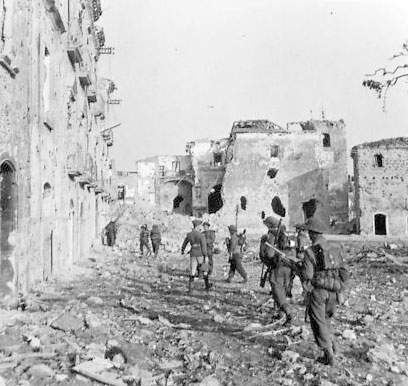 ....... By that evening,
May 26th
1944,
north of
Cassino
on the
Hitler Line,
the town of
Aquino
(right)
had been fully
cleared. There
was a general
surge forward
and the recce
(reconnoitering)
parties were
called out yet
again. The move
to the next
position was a
tortuous one,
crawling along
hot dusty tracks
and, every now
and then,
enduring long
hold-ups due to
traffic jams.
All this time,
we could see
battles in
progress on the
hillsides to our
right rear. ....... By that evening,
May 26th
1944,
north of
Cassino
on the
Hitler Line,
the town of
Aquino
(right)
had been fully
cleared. There
was a general
surge forward
and the recce
(reconnoitering)
parties were
called out yet
again. The move
to the next
position was a
tortuous one,
crawling along
hot dusty tracks
and, every now
and then,
enduring long
hold-ups due to
traffic jams.
All this time,
we could see
battles in
progress on the
hillsides to our
right rear.
After some time,
we were beyond
Aquino
and crossed the
railway to
regain
Highway Six.
Pressing on northwards,
the
signs of battle
were noticeably
fewer and we spent the night
in a farmhouse before
proceeding to
the designated
gun area the
next day. There
were crowds of
civilians
around, all
anxious to be
friendly and
telling us that
t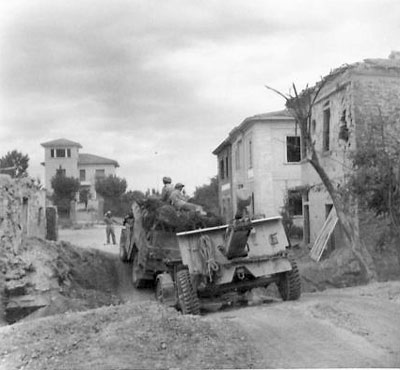 hey had been awaiting our
arrival for over
four months.
That night, the
Luftwaffe sent
out its bombers
to strafe and
bomb
Highway Six
and the rear
areas. Our
previous gun
position, where
they were still
in action,
received a
pounding but,
despite near
misses, suffered
no casualties. hey had been awaiting our
arrival for over
four months.
That night, the
Luftwaffe sent
out its bombers
to strafe and
bomb
Highway Six
and the rear
areas. Our
previous gun
position, where
they were still
in action,
received a
pounding but,
despite near
misses, suffered
no casualties.
The new position
proved to be in
a field,
overlooked by
several
mountains to the
east as well as
by the town of
Roccasecca,
all still in
enemy hands. The
guns followed us
in but, despite
the lack of
cover, we were
undisturbed and
spent a quiet
time there.
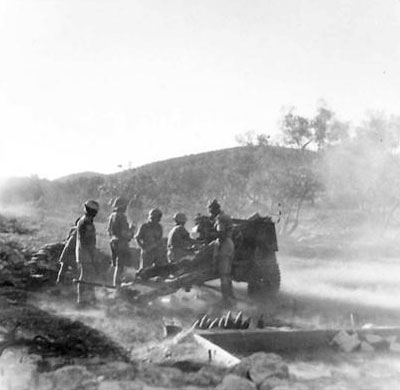 On
May 28th,
another move
took us to a
position near
Arce, in
the
MonteGrande/Monte
Piccolo
area. Moving up
with the main
Battery,
everything
seemed quiet
with nothing
much to be seen
except for the
odd tin hat
sticking out of
the ditch, with
a chap crouching
beneath it. We
were soon to
discover the
reason for the
caution as a
welcoming salvo
of artillery
shells and
mortar bombs
arrived and we
had to dash for
cover. A
ding-dong battle
developed, and
Monte Grande
changed hands
more than once.
We fired "Uncle"
targets (a
codename for a
concentrated
salvo of the 72
guns of the
three Divisional
Field Regiments
upon a single
map reference
point) at rather
short ranges.
The next day,
the recce party
moved ahead once
more, proceeding
along
Highway 6
to
Ceprano.
North of here,
even our
Observation Post
and infantry
were to the rear
of us and we set
up in a small
house where,
happily, all
remained
peaceful. On
May 28th,
another move
took us to a
position near
Arce, in
the
MonteGrande/Monte
Piccolo
area. Moving up
with the main
Battery,
everything
seemed quiet
with nothing
much to be seen
except for the
odd tin hat
sticking out of
the ditch, with
a chap crouching
beneath it. We
were soon to
discover the
reason for the
caution as a
welcoming salvo
of artillery
shells and
mortar bombs
arrived and we
had to dash for
cover. A
ding-dong battle
developed, and
Monte Grande
changed hands
more than once.
We fired "Uncle"
targets (a
codename for a
concentrated
salvo of the 72
guns of the
three Divisional
Field Regiments
upon a single
map reference
point) at rather
short ranges.
The next day,
the recce party
moved ahead once
more, proceeding
along
Highway 6
to
Ceprano.
North of here,
even our
Observation Post
and infantry
were to the rear
of us and we set
up in a small
house where,
happily, all
remained
peaceful.
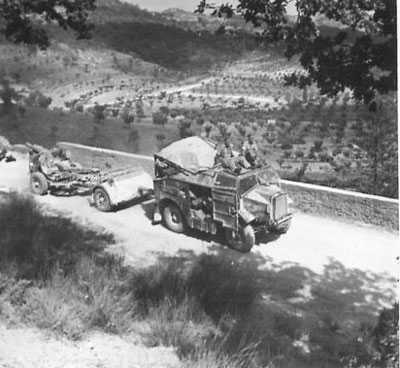 The rate of
advance
continued to
accelerate
though we still
met with
determined
resistance at
several places.
Meanwhile, on
the coastal
sector to our
west, the
Anzio
beachhead had
finally linked
up with the main
Fifth
Army and
there was a
general thrust
forward towards
Rome. The rate of
advance
continued to
accelerate
though we still
met with
determined
resistance at
several places.
Meanwhile, on
the coastal
sector to our
west, the
Anzio
beachhead had
finally linked
up with the main
Fifth
Army and
there was a
general thrust
forward towards
Rome.
On
May 31st we
pressed on to a
position near
Ripi
where it was
quiet except for
a number of
mines which had
been laid in the
area, causing
the loss of one
of our water
trucks shortly
after arrival.
Again we pushed
onwards, next
day reaching a
point just to
the south of
Frosinone.
It was on
June
2nd that we
passed through
that town
(below, on
May 31st)
and
branched off the
main road to the
north-east. Unkindly, the
suggestion was
that this was
done so as to
leave the way to
Rome
clear for the
Americans.
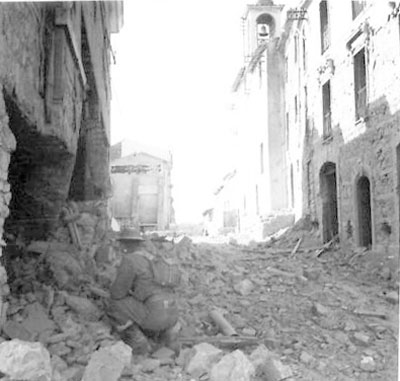 We
reached one
designated area,
and orders came
through to
proceed further.
So it was that
we went bowling
along the road
to
Alatri.
Within sight of
the town,
progress came to
a sudden halt as
we encountered a
sharp battle for
possession
taking place
immediately
ahead of us. It
was decided that
the Regiment
would move up
and go into
action just
where we were,
and so we busied
ourselves with
the usual
preparatory
work. To our
rear, we could
see a battery of
self-propelled
guns belonging
to one of the
Armoured
Divisions,
firing over open
sites at a
church tower
where the enemy
was supposed to
have established
an observation
post.
Some
unfriendly fire
came our way and
I found myself
reasonably safe
shelter and
remained there
intermittently
for some hours. We
reached one
designated area,
and orders came
through to
proceed further.
So it was that
we went bowling
along the road
to
Alatri.
Within sight of
the town,
progress came to
a sudden halt as
we encountered a
sharp battle for
possession
taking place
immediately
ahead of us. It
was decided that
the Regiment
would move up
and go into
action just
where we were,
and so we busied
ourselves with
the usual
preparatory
work. To our
rear, we could
see a battery of
self-propelled
guns belonging
to one of the
Armoured
Divisions,
firing over open
sites at a
church tower
where the enemy
was supposed to
have established
an observation
post.
Some
unfriendly fire
came our way and
I found myself
reasonably safe
shelter and
remained there
intermittently
for some hours.
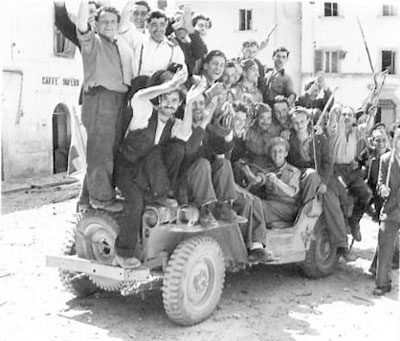 Towards evening,
the town of
Alatri
(right)
was taken: our
guns, still
moving forward,
had not reached
this so orders
were given for
us to go back
and rendezvous
with them at a
specified point,
midway along the
road back to
Frosinone.
The higher
command had
decided that the
Division would
remain in that
area for a few
days, whilst
other formations
maintained their
thrust
northwards. It
was here that we
learned of the
fall of
Rome on
June 4th; this
welcome news was
soon
overshadowed by
that of the
Normandy
invasion two
days later. As a
diversion, I had
been running a
small sweepstake
in the battery;
the winner was
to receive the
kitty in
exchange for
having correctly
forecast the
date of the
landings.
Somebody duly
won, I forget
who it was, but
I think that a
few of them were
surprised to
find that I had
safely retained
all the stake
money and was
actually able to
pay out on the
nail! Towards evening,
the town of
Alatri
(right)
was taken: our
guns, still
moving forward,
had not reached
this so orders
were given for
us to go back
and rendezvous
with them at a
specified point,
midway along the
road back to
Frosinone.
The higher
command had
decided that the
Division would
remain in that
area for a few
days, whilst
other formations
maintained their
thrust
northwards. It
was here that we
learned of the
fall of
Rome on
June 4th; this
welcome news was
soon
overshadowed by
that of the
Normandy
invasion two
days later. As a
diversion, I had
been running a
small sweepstake
in the battery;
the winner was
to receive the
kitty in
exchange for
having correctly
forecast the
date of the
landings.
Somebody duly
won, I forget
who it was, but
I think that a
few of them were
surprised to
find that I had
safely retained
all the stake
money and was
actually able to
pay out on the
nail!
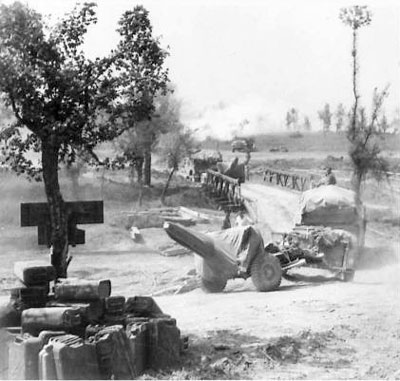 On
June 7th we
were ordered to
be on the move
again: rumour
had it that the
destination was
to be either
Pisa or
Florence,
both to be taken
within a
fortnight, or so
an optimistic
general staff
would have us
believe!
The
following day,
June 8th, we
started off,
first to
Frosinone
to rejoin
Highway Six,
on which we
proceeded to its
"source" in
Rome
itself.
Valmontone
appeared to have
been severely
devastated but
by the time the
outskirts of the
capital were
reached, were
very few signs
of damage to be
seen. On
June 7th we
were ordered to
be on the move
again: rumour
had it that the
destination was
to be either
Pisa or
Florence,
both to be taken
within a
fortnight, or so
an optimistic
general staff
would have us
believe!
The
following day,
June 8th, we
started off,
first to
Frosinone
to rejoin
Highway Six,
on which we
proceeded to its
"source" in
Rome
itself.
Valmontone
appeared to have
been severely
devastated but
by the time the
outskirts of the
capital were
reached, were
very few signs
of damage to be
seen.
Our passage
through the
centre of
Rome was
a moving
experience,
especially after
all the weeks of
"slog" to get
there. There
were huge crowds
of Romans
milling around
and most of them
seemed happy
enough to have
us there.
Continuing
northwards we
headed out of
the city on a
new axis,
Highway Three
(via Flaminia)
to a point near
San Oreste,
some 40km or 25
miles due north
of
Rome.
Here the German
General
Kesselring
had established
his HQ set in a
large
underground
township, carved
out from beneath
a prominent
hill. All seemed
very quiet –
perhaps
suspiciously so.
Next morning,
June 9th, we
were shaken to
receive sudden
orders to bring
the guns into
action
immediately as a
scare was on,
due to the
reported
presence of
armed raiding
parties in the
area, and we
heard one of the
Divisional
Headquarters
sites had been
shelled
overnight. As in
the past, we
were allocated a
platoon of
infantry for
"local
protection" and
they duly
arrived, dug
themselves in
all around us
and set up Bren
guns........."
|
|
And
so tomorrow,
June 8th, exactly
80 years ago, I shall
think of Our Kid (as we
always called each
other), trundling through
the middle of
Rome with
the rest of his Battery
and their 25-pounder
guns, sitting in the
back of his truck and
happily accepting
flowers and glasses of
Chianti from grateful
Roman maidens while the
rest of the smiling
crowd shout out and wave
handkerchieves. Unless
of course the population
has run run out of such
things after three or
four days of celebrating
the departure of the
Germans. I shall see him
still, in my mind's eye,
conscious of the
historic moment he is
living through in that
most historic of cities
for, even at his young
age, he already has an
interest in such things.
And enjoying it too:
at
that moment at least,
and even though his
battles are no longer
the first item on the
BBC News, it's
definitely all a lot nicer
than being in
Normandy......
And then, I imagine him
an hour or two later,
after all the excitement.
The city suburbs have
been left behind long
ago. The crowds have
disappeared. There's
just the constant roar
of the lorry's engine.
An Austin or a Bedford
or even a Dodge. In
front of them and behind
them, bigger vehicles
each tow a 25-pounder.
Some of the crew sit on
top of these strange
looking tractors,
enjoying the fierce
afternoon sun until it
gets too much for them.
Behind them their guns
bounce and rattle over
the broken-up surface.
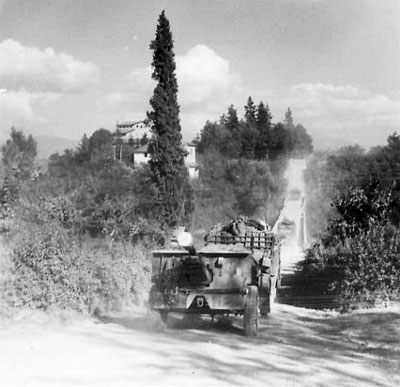 On
and on they go.
Through open countryside
and ruined villages.
Clouds of dust come up
from all the wheels,
mixing with the fumes of
the vehicle in front,
all around the lorry and
inside it too. The sun
of early summer beats
down on the canvas roof.
It's hot and smelly and
gritty and everything is
jolting and the seat is
hard and the uniform is
itchy. Graham has his
arm raised as he holds
on to a roof stay to
steady himself, as do
the others. They all
know there's a job still
to be done, ahead. What
would he give at that
moment, I think to
myself, for a lovely,
quiet pint of bitter at
the
Hardwick Arms
in
Streetly with
his Home Guard mates -
including our father -
and afterwards perhaps a
game of solo or
cribbage? Or even, at a
pinch, at the
Parson &
Clerk - although without
Dad because he would never
have set
foot in the place. On
and on they go.
Through open countryside
and ruined villages.
Clouds of dust come up
from all the wheels,
mixing with the fumes of
the vehicle in front,
all around the lorry and
inside it too. The sun
of early summer beats
down on the canvas roof.
It's hot and smelly and
gritty and everything is
jolting and the seat is
hard and the uniform is
itchy. Graham has his
arm raised as he holds
on to a roof stay to
steady himself, as do
the others. They all
know there's a job still
to be done, ahead. What
would he give at that
moment, I think to
myself, for a lovely,
quiet pint of bitter at
the
Hardwick Arms
in
Streetly with
his Home Guard mates -
including our father -
and afterwards perhaps a
game of solo or
cribbage? Or even, at a
pinch, at the
Parson &
Clerk - although without
Dad because he would never
have set
foot in the place.
The lorry trundles on,
together with hundreds
of others, through the
long, hot afternoon. To
the north. Ever onwards.
Towards the front line
and all the battles
still to be fought.
That is all tomorrow,
exactly 80 years ago,
when he was 21 and I was
8. And so I shall
think of him then, as he
enjoys his few minutes
crossing the very centre of
Rome. And of all the
thousands and thousands of young men
just like him, there in
Italy, and in Normandy,
the Far East and other
places, their futures
unsure and wholly unknown to them -
our grandfathers, our fathers
and uncles, even
our elder brothers,
perhaps.
We owe all of them our
respect and our thanks
and we must never forget
them. I certainly
shan't. |
ACKNOWLEDGEMENTS
Please see INDEX page for
general acknowledgements.
Grateful acknowledgement is made to:
-
The Imperial War Museum, the
source of all the military images on
this page
- The British Newspaper Archive
- family members
This
family and local history page is
hosted by
www.staffshomeguard.co.uk
(The Home Guard of Great Britain,
1940-1944)
All
text and images are, unless
otherwise stated, © The Myers Family
2024
|
INDEX
Home Guard of Great Britain
website
|

|
INDEX
Streetly and Family Memories
1936-61
|
L8A2
7th June 2024
-
© The
Myers Family 2024


| |